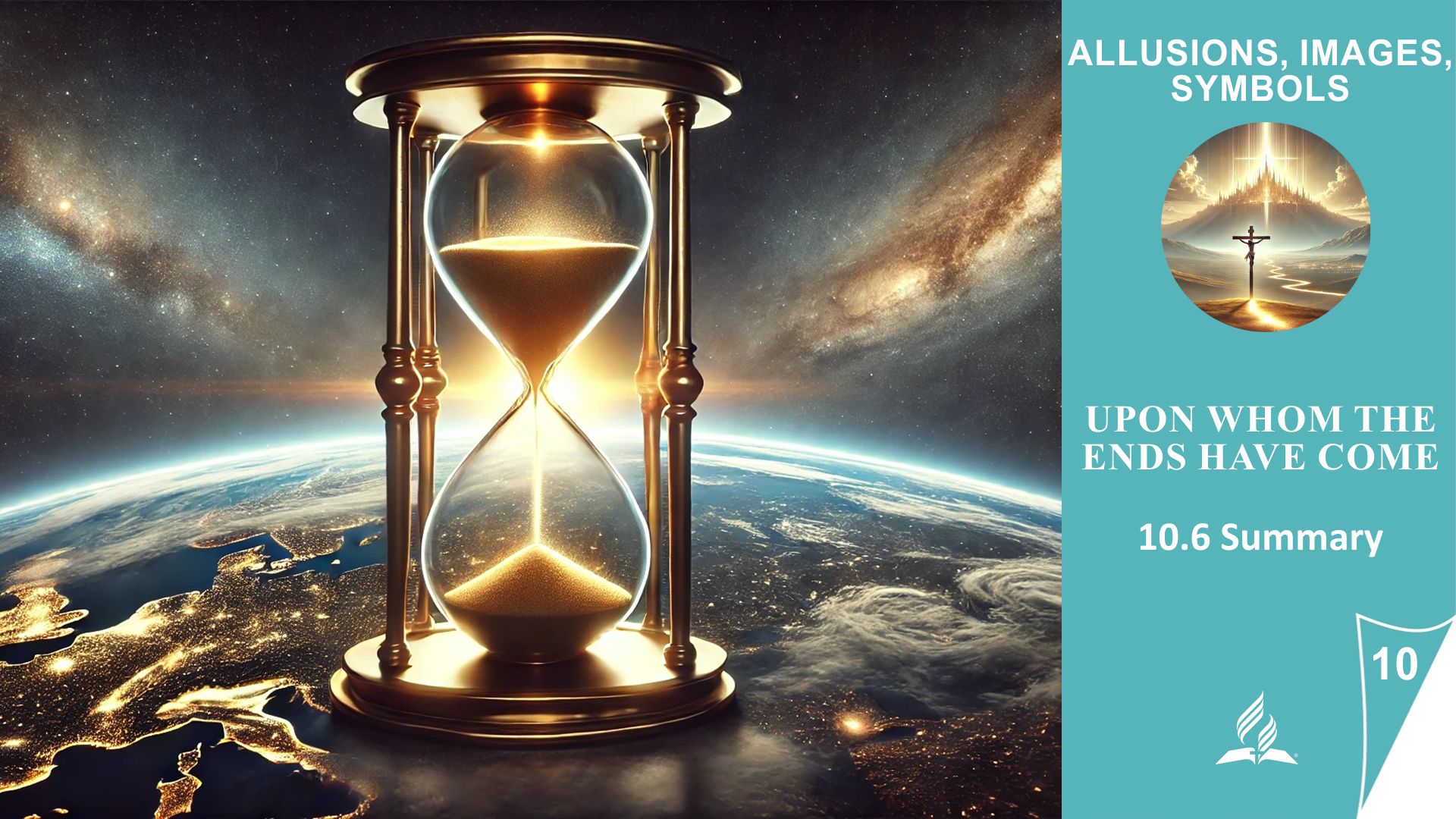


⛪ Lesson 10: Upon Whom the Ends Have Come
📘 10.5 The Pre-Advent Judgment
✨ When the Final Hour Strikes – Insights for the End Times
…………………………………………………………………
🟦 Introduction
The Bible speaks not only prophetically and openly about the end of the world, but often also implicitly and existentially. It shows, through historical events—such as Creation, the Flood, Sodom and Gomorrah, and the life of Daniel—principles that point directly into the future. The hope for the Kingdom of God is already visible in the beginnings of the story.
This lesson teaches us:
God’s plan has been directed toward eternity from the very start—and you are part of it.
………………………………………………………………….
📖 Bible Study – The Message of the End in the Old Testament
🌍 1. Creation – the Beginning Is the Promise of the End
The world begins with a divine word. Sabbath, the goal of the Creation week, points not only back to God’s work but forward to eternal rest (cf. Heb 4:9). Hope for a new Eden is deeply embedded in Creation—we come from God’s hand, and history leads back to Him (Rev 21).
🌊 2. The Flood – Judgment and Salvation at Once
As in the days of Noah: people lived as if there were no tomorrow. But suddenly, judgment came. Jesus Himself draws this parallel to the end times. The Flood reminds us that God’s patience has limits. But it also shows: God saves those who trust Him. The Ark is a symbol of Christ—our secure refuge.
🔥 3. Sodom and Gomorrah – Grace before Judgment
God shares His plans with Abraham—just as He does with His children today. Abraham intercedes for others—persistently, humbly, courageously. That too is an end-times model: intercession instead of indifference. The destruction of Sodom is God’s response to unbridled wickedness, yet His patience and mercy remain evident.
🏛 4. Daniel – Living with an Eternal Perspective
Daniel lives at the heart of the world power Babylon—but he lives differently. His diet, his attitude, his faith: everything is shaped by the Kingdom of God. Daniel shows us that it is possible to live by God’s principles in a godless world, and that hope for the eternal Kingdom can shape our thinking, decisions, and actions.
………………………………………………………………….
✨ Spiritual Principles
God’s story is not past; it is moving toward its goal.
Every beginning in the Bible carries within it the promise of a new ending.
God’s judgment is always accompanied by grace, patience, and salvation.
Our present life is part of a larger narrative—an eternal one.
Faith shows itself in everyday life: in what we eat, how we think, how we behave, and in our relationships.
………………………………………………………………….
🧩 Application in Daily Life
Live consciously with eternity in your heart—remember that your life is more than this world.
Keep the Sabbath as a weekly foretaste of the coming Kingdom of God.
Practice intercession—pray for people who are far from God, just as Abraham did.
Live integratively, even in a godless environment—like Daniel.
Act according to God’s standards, even when they seem outdated or uncomfortable.
Trust that God sees your life—and does not forget what you do in secret.
………………………………………………………………….
✅ Conclusion
God’s story is a movement from beginning to completion. What started in Eden will end in the new Creation. And in between stands you—invited to make your life part of this hope.
………………………………………………………………….
💭 Thought of the Day
“God has placed eternity in our hearts—so that we do not perish in the transient.”
– freely after Ecclesiastes 3:11
………………………………………………………………….
✍️ Illustration – The Day Everything Changed
The day began like any other. Jonas woke up late, the coffee machine was empty, and his little brother had unplugged the Wi-Fi router again, convinced it would improve his “ping.” Nothing special. Nothing world-shaking. And yet—something felt different.
It had rained heavily overnight. The street in front of the house was half-flooded, and neighbors were cursing softly as they tried to move their cars. Jonas pulled on his black jacket, slung his backpack over his shoulder, and ran toward the bus stop. The air smelled of earth, fresh, almost like… like the beginning. He couldn’t describe it, but the day felt like a beginning. Or an end.
At school, everyone was talking about the earthquake in Turkey. A 7.9—severe, many dead. During the break someone said, “Climate change, pandemic, war, now an earthquake—this is no longer normal.” Jonas listened but said nothing. He was thinking about what he had read the night before. A random Bible passage that had opened before him when he idly flipped through his grandmother’s old Bible: “As it was in the days of Noah, so will it be at the coming of the Son of Man…”
He could not forget that sentence. It kept appearing in his mind’s eye. What was it like in the days of Noah? Had anyone cared? Or had everyone continued eating, building, living as if nothing were happening?
After class, Jonas did not go straight home. Instead, he headed to the small park behind the library. It was quiet there; you could hear the birds, the water, the wind—things you easily miss in everyday life. He sat on a bench, pulled the old book from his backpack, and opened it again. This time he landed in Genesis. The Creation. “And God saw that it was good.”
Was it? Was it still good?
Jonas thought about his environment, about his school, about himself. People were living as if there were no tomorrow—but everyone was afraid of tomorrow. Some hid in distraction, others in control. And others—like him—simply felt lost. Was there a plan? A beginning and an end?
His thoughts were interrupted by a message: “Are you coming today or not?” It was his girlfriend, Leni. He texted back, “I’m on my way.” But he didn’t go. He stayed seated.
Because in that moment he realized: If there is a Creator, then there is also purpose. If there was meaning at the beginning, then there is also meaning at the end. And if that’s true—then I’m not a coincidence.
Over the following week, Jonas began to live differently on purpose. Not fanatically, not dramatically—but honestly. He asked questions. He searched. He began to observe the Sabbath consciously—not because he had to, but because he wanted to understand what “rest” means in a world that never stands still.
He didn’t change everything overnight. But he became quieter. More awake. More observant. And gradually, he grew braver as well. He read about Daniel, who lived in Babylon yet remained faithful inwardly. He saw himself in these stories— not as a hero, but as someone who wanted to belong: to God’s story.
One day he was sitting in the cafeteria when his classmate Chiara joined him. “You’ve become somehow calmer,” she said. “But not in a bad way. More… peaceful.”
Jonas smiled. “I think I’ve found something.”
She frowned. “What?”
He hesitated, then said, “Purpose. Direction. Hope.”
She looked at him for a long moment. “That’s rare.”
He nodded. “I know.”
That evening he sat again in the park, alone under the open sky. The clouds had moved on, and on the horizon stretched a thin rainbow. No loud sign. No miracle. Just an arc of light—still and yet profound.
Jonas didn’t know what would happen tomorrow. But he knew: He no longer belonged only to a world in decline. He belonged to a story heading toward renewal.
And that was enough.




















